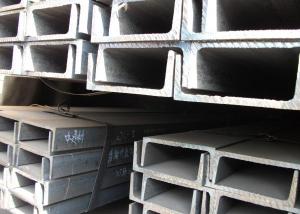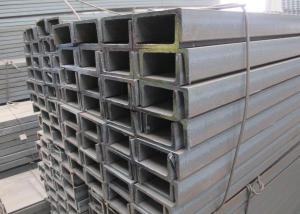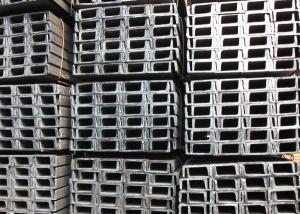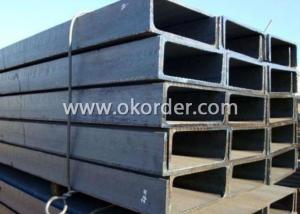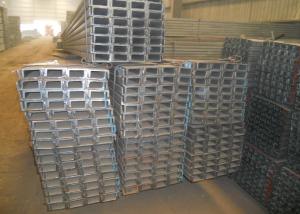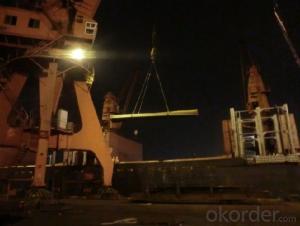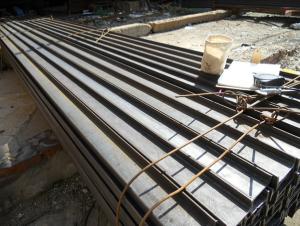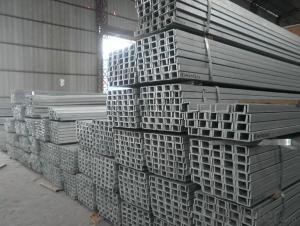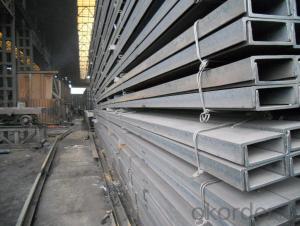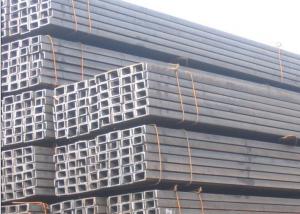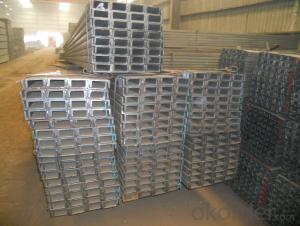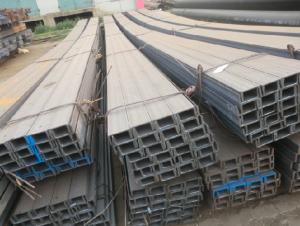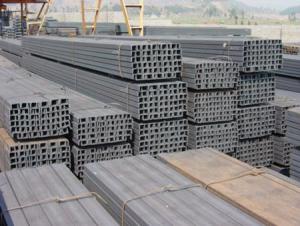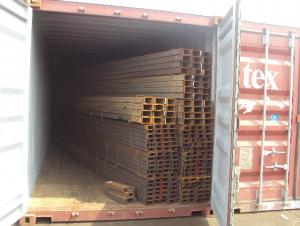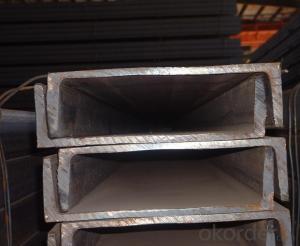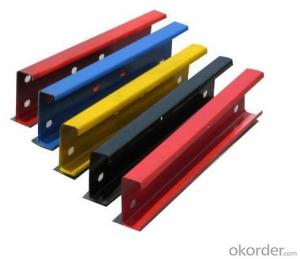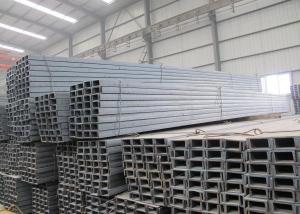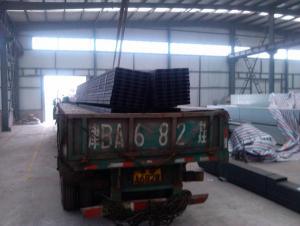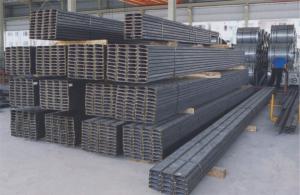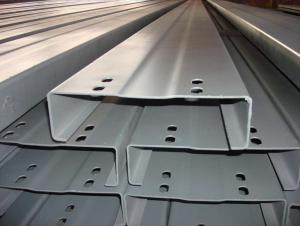HR Channel Steel
- Loading Port:
- Xingang Port
- Payment Terms:
- TT or LC
- Min Order Qty:
- 25MT m.t.
- Supply Capability:
- 80000-100000MTS/YEAR m.t./month
OKorder Service Pledge
OKorder Financial Service
You Might Also Like
Specifications of HR Channel Steel:
1.We supply high quality HR Channel steel at reasonable price, including Chinese standard, Japanese standard and so on.
|
Standard |
GB/JIS/EN/ASTM/DIN |
|
Material Grade |
Q235B,Q235,Q345,Q345B,SS400,S235JRG1,A36,ST37-2 |
|
Technique: |
Hot Rolled |
|
Sizes as per chinese standard: |
50*37*4.5mm - 300*89*11.5mm
|
|
Sizes as per japanese standard: |
50*25*3mm – 200*80*7.5mm |
|
Length: |
6meter, 9meter, 12meter |
Note: we are also competent to provide our customers other HR Channel Steel based on other sizes according to customer’s requirements.
2. The detailed sections of HR Channel Steel as per GB standard.Just as followings in the table-1:
|
GB U CHANNEL |
Standard h |
Sectional b |
Dimension s |
t |
Mass: Kg/m |
|
|
(mm) |
(mm) |
(mm) |
(mm) |
|
|
50X37 |
50 |
37 |
4.50 |
7.0 |
5.438 |
|
63X40 |
63 |
40 |
4.80 |
7.5 |
6.634 |
|
80x43 |
80 |
43 |
5.00 |
8.0 |
8.045 |
|
|
|
|
|
|
|
|
100x48 |
100 |
48 |
5.30 |
8.5 |
10.007 |
|
120x53 |
120 |
53 |
5.50 |
9.0 |
12.059 |
|
140x58 |
140 |
58 |
6.00 |
9.5 |
14.535 |
|
140x60 |
140 |
60 |
8.00 |
9.5 |
16.733 |
|
|
|
|
|
|
|
|
160x63 |
160 |
63 |
6.50 |
10.0 |
17.240 |
|
160x65 |
160 |
65 |
8.50 |
10.0 |
19.752 |
|
|
|
|
|
|
|
|
180x68 |
180 |
68 |
7.00 |
10.5 |
20.174 |
|
180x70 |
180 |
70 |
9.00 |
10.5 |
23.000 |
|
|
|
|
|
|
|
|
200x73 |
200 |
73 |
7.00 |
11.0 |
22.637 |
|
200x75 |
200 |
75 |
9.00 |
11.0 |
25.777 |
|
|
|
|
|
|
|
|
220x77 |
220 |
77 |
7.00 |
11.5 |
24.999 |
|
220x79 |
220 |
79 |
9.00 |
11.5 |
28.453 |
|
|
|
|
|
|
|
|
250x78 |
250 |
78 |
7.00 |
12.0 |
27.410 |
|
250x80 |
250 |
80 |
9.00 |
12.0 |
31.335 |
|
250x82 |
250 |
82 |
11.00 |
12.0 |
35.260 |
|
|
|
|
|
|
|
|
280x82 |
280 |
82 |
7.50 |
12.5 |
31.427 |
|
280x84 |
280 |
84 |
9.50 |
12.5 |
35.823 |
|
280x86 |
280 |
86 |
11.50 |
12.5 |
40.219 |
|
|
|
|
|
|
|
|
300x85 |
300 |
85 |
7.50 |
13.5 |
34.463 |
|
300x87 |
300 |
87 |
9.50 |
13.5 |
39.173 |
|
300x89 |
300 |
89 |
11.50 |
13.5 |
43.883 |
Table-1
3. The chemical composition of HR Channel Steel according to Q235B is shown in Table-2.
|
Alloy No |
Grade |
Element(%) | ||||
|
C |
Mn |
S |
P |
Si | ||
|
Q235 |
B |
0.12-0.20 |
0.3-0.7 |
≦0.045 |
≦0.045 |
≦0.3 |
Table-2
Note: we are able to present our customers relevant SGS test report for chemical composition of HR Channel Steel.
4. The mechanical property of HR Channel Steel according to Q235B is shown in Table-3-1 and Table-3-2
|
Alloy No |
Grade |
Yielding Strength Point(Mpa) | |||
|
Thickness(mm) | |||||
|
≦16 |
>16-40 |
>40-60 |
>60-100 | ||
|
≧ | |||||
|
Q235 |
B |
235 |
225 |
215 |
205 |
Table-3-1
|
Alloy No |
Grade |
Tensile Strength(Mpa) |
Elongation After Fracture(%) | |||
|
|
Thickness(mm) | |||||
|
≦16 |
>16-40 |
>40-60 |
>60-100 | |||
|
≧ | ||||||
|
G235 |
B |
375-500 |
26 |
25 |
24 |
23 |
Table-3-2
Note: we are able to present our customers relevant SGS test report for mechanical property of HR Channel Steel as customer’s request.
Applications of HR Channel Steel:
The HR Channel Steel can be applied to construction of warehouses, workshops, sport stadiums and car parks etc.The hot rolled channel steel belongs to carbon structural steel which is applied to in the field of construction and machinery.In details, the hot rolled channel steel is usually used for arch-itechtural structure, and they could be welded in order to support or hang a vari-ety of facilities. They are also usually used in combination with I beam. Generally,the hot rolled channel steel we supply must possess perfect welding property, riveting property and mechanical property and so on.
Package & Delivery of HR Channel Steel:
1.The hot rolled channel steel will be packed in bundle with steel wire at each end of every bundle and color marking in order to help the customer to recognize his goods more easily at sight.
2. And the hot rolled channel steel could be loaded into 20ft or 40ft container, or by bulk cargo.If the weight of each bundle reaches more than 3.5 mt, the loading by break bulk cargo should be choosed.When the weight of each bundle reaches less than 3mt, the loading by container should be choosed.
3.As for the transportaion from mill to loading port, the truck will be usually used. And the maximum quantity for each truck is 40mt.
4.All in all, we could do in accordance with customer's request.
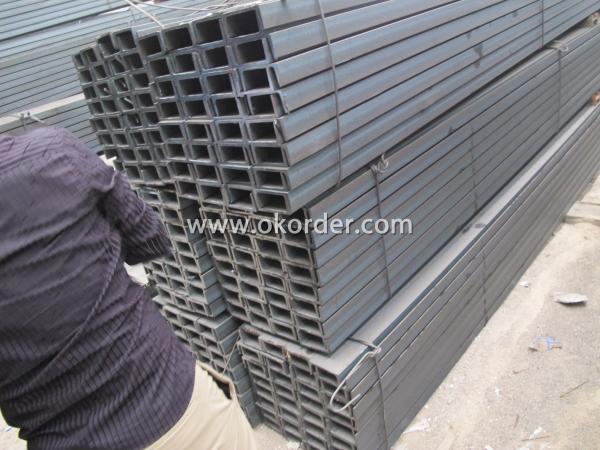
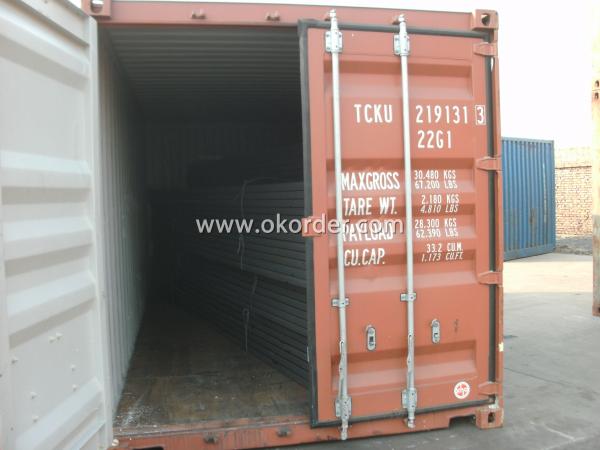
Production Flow of HR Channel Steel:
1.The steel billet shall be heated in the high temperature furnace.
2. The heated steel billet shall be rolled five to nine times with the aim of shaping the general figure of steel u channel.
3. The hot rolled channel steel should be put onto the cooling bed to make the temperature low.
4. The channel steel should be straighted on the straightener.
5. The straighted channel steel will be cut into meters by saw, as per customer's requirements.
- Q: How do steel channels contribute to the overall longevity of a structure?
- Steel channels contribute to the overall longevity of a structure in several ways. Firstly, steel channels are known for their strength and durability. They can withstand heavy loads and resist deformation, ensuring the structural integrity of the building over time. This strength is particularly important in areas prone to earthquakes, strong winds, or heavy snow loads. Additionally, steel channels provide a high degree of corrosion resistance. Steel is inherently resistant to rust and deterioration, especially when properly coated with protective finishes. This resistance to corrosion ensures that the structure remains stable and secure for an extended period, even in harsh environments or coastal areas where saltwater exposure is a concern. Moreover, steel channels are highly versatile and can be easily customized and fabricated to meet specific design requirements. This adaptability allows architects and engineers to create complex and innovative structures that are both aesthetically pleasing and structurally sound. Steel channels can be integrated into various building systems, such as framing, roofing, and cladding, providing a seamless and efficient construction process. Furthermore, steel channels have a long lifespan compared to other building materials. Unlike wood or concrete, steel does not rot, warp, or crack over time. This longevity reduces the need for frequent repairs and replacements, saving both time and money in the long run. Additionally, steel is a sustainable and recyclable material, contributing to the overall environmental friendliness of the structure. In conclusion, steel channels contribute significantly to the overall longevity of a structure by providing strength, durability, corrosion resistance, versatility, and a long lifespan. Their ability to withstand various loads and environmental conditions ensures the structural integrity of the building, while their customization options and recyclability make them an excellent choice for sustainable construction practices.
- Q: Do steel channels have any specific load distribution characteristics?
- Yes, steel channels do have specific load distribution characteristics. Steel channels are commonly used in structural applications as they provide excellent strength and load-carrying capacity. The load distribution characteristics of steel channels depend on their shape, size, and orientation. Steel channels typically have a C-shaped cross-section, with a flat back and two perpendicular flanges. The load distribution characteristics of steel channels are primarily influenced by the flanges. The flanges act as beams that resist bending and carry the applied load. The load is distributed along the length of the flanges, creating a load path that transfers the load to the supports or other structural elements. The load distribution characteristics of steel channels are also influenced by the size and orientation of the channel. Larger channels with wider flanges can distribute the load over a larger area, reducing the stress concentration. Additionally, the orientation of the channel, whether it is vertical or horizontal, can affect the load distribution characteristics. It is important to consider the load distribution characteristics of steel channels during the design and analysis of structures. Engineers need to ensure that the channels are properly sized and oriented to adequately distribute the applied loads. By considering these characteristics, steel channels can effectively distribute the load and contribute to the overall structural integrity and stability of a construction project.
- Q: Can steel channels be used for supporting rooftop gardens?
- Yes, steel channels can be used for supporting rooftop gardens. Steel channels are strong and durable, making them suitable for supporting the weight and load of rooftop gardens. They provide structural support and stability, ensuring that the garden remains secure and stable on top of a building. Steel channels can be used to create raised beds or platforms for the garden, allowing for proper drainage and a solid foundation. Additionally, steel channels can be customized and fabricated to fit the specific requirements and dimensions of the rooftop garden, making them a versatile choice for this purpose.
- Q: What are the different loadings that steel channels can withstand?
- Steel channels can withstand a wide range of loadings, making them a versatile and reliable structural component. The specific loadings that steel channels can withstand depend on various factors, including the type and grade of steel, the size and shape of the channel, and the design of the overall structure. Steel channels are commonly used in construction and engineering applications to provide support and stability. They can withstand both static and dynamic loadings, which include dead loads, live loads, and environmental loads. Dead loads refer to the weight of the structure itself, including the weight of the steel channels and any other components or materials. Steel channels are designed to bear this constant load without deformation or failure. Live loads are temporary loads that can vary in magnitude and location. These loads include the weight of people, furniture, equipment, and other transient forces. Steel channels are designed to support these loads and distribute them effectively to other structural members. Environmental loads include wind loads, snow loads, and seismic loads. Steel channels are designed to resist these external forces and maintain the structural integrity of the building or structure. Wind loads can exert significant pressure on the channels, especially on tall or exposed structures. Snow loads can accumulate and add weight to the structure, which the steel channels must be able to support. Seismic loads refer to the forces generated during an earthquake, and steel channels are designed to withstand these dynamic loads and prevent the structure from collapsing. In addition to these common loadings, steel channels can also withstand other specialized loadings, such as impact loads, vibration loads, and thermal loads. Impact loads can occur due to accidental collisions or sudden impact events and require steel channels to have high strength and toughness. Vibration loads can result from machinery or equipment operation and require steel channels to have good fatigue resistance. Thermal loads can cause expansion and contraction of the steel channels due to temperature changes, and they must be designed accordingly to prevent failure. Overall, steel channels have a high load-bearing capacity and can withstand a wide range of loadings, making them suitable for various structural applications in construction, engineering, and industrial sectors.
- Q: Six meters long, standard 10 channel steel, theoretical weight
- Six meters long standard 10# channel steel, theoretical weight is 60kg.Check the table, there are 10# channel steel per meter theoretical weight of 10.007kg/m, so the theoretical weight of 6 meters is: 10.007x6=60kg.
- Q: What are the different types of bracing systems used with steel channels?
- There are several types of bracing systems used with steel channels, including knee bracing, cross bracing, and diagonal bracing. Knee bracing involves using steel angles to connect the channel to the supporting structure, providing lateral stability. Cross bracing involves diagonal members connecting different channels or sections, increasing overall rigidity. Diagonal bracing consists of diagonal members connecting the top and bottom flanges of the channel, providing stability against lateral loads.
- Q: What kind of steel products are there, such as channel steel, angle iron and so on?
- Round steelAs the name suggests, round steel is round section of circular solid steel, divided into hot rolling, forging and cold drawn three. Round steel has many materials, such as: 10#, 20#, 45#, Q215-235, 42CrMo, 40CrNiMo, GCr15, 3Cr2W8V, 20CrMnTi, 5CrMnMo, 304, 316, 20Cr, 40Cr, 20CrMo, 35CrMo and so on.Hot rolled round steel specifications 5.5-250 mm, small round steel is 5.5-25 mm, straight bundles of supply, as steel, bolts and various mechanical parts; greater than 25 mm round steel, mainly used in the manufacture of mechanical parts or seamless steel tube blank.
- Q: What are the different types of steel channel sections?
- In construction and engineering applications, various steel channel sections are commonly utilized. Some of the frequently used types are as follows: 1. C-channel: Employed for structural support and framing in construction projects, this steel channel features a C-shaped cross section. 2. U-channel: For applications demanding strength and rigidity, such as bridge and building construction, this steel channel with a U-shaped cross section is often chosen. 3. Hat channel: Also referred to as a furring channel, this steel channel has a hat-shaped cross section and is commonly used in the construction industry to attach drywall or other materials to walls and ceilings. 4. Z-channel: In scenarios where there is a need to join two pieces of material, like metal roofs or walls in construction, this steel channel with a Z-shaped cross section is commonly employed. 5. Box channel: This steel channel, with a square or rectangular cross section, is frequently used when a high strength-to-weight ratio is required, such as in the construction of bridges or support beams. These examples illustrate only a few of the available steel channel section types. The selection of the specific steel channel depends on the project's requirements and the desired strength and rigidity of the structure.
- Q: How are steel channels used in the construction of bridges?
- Due to their strength and versatility, steel channels are widely utilized in bridge construction. These channels, also referred to as C-channels or C-sections, have a "C" shape and a rectangular cross-section with flanges on both sides. In the construction of bridges, steel channels serve various purposes. Firstly, they are commonly used as beams or girders to provide support and bear the load of the bridge. Steel channels can be arranged parallel or in a lattice-like pattern to form the main framework of the bridge. The flanges on the channels help evenly distribute the weight, ensuring structural stability. Moreover, steel channels are frequently employed as braces or struts in bridge construction, resisting lateral forces like wind or earthquakes. This prevents the bridge from swaying or collapsing. By strategically placing steel channels at key points along the bridge, engineers can enhance its strength and durability. Additionally, steel channels are utilized as purlins or trusses in the construction of bridge decks. They offer support for the concrete or steel deck, ensuring it can withstand the weight of vehicles and pedestrians. Steel channels also play a role in constructing railings and guardrails, providing safety features for bridge users. The use of steel channels in bridge construction brings numerous advantages. Steel is known for its high strength-to-weight ratio, making it ideal for bridges that need to support heavy loads. It is also highly durable, corrosion-resistant, and capable of withstanding harsh environmental conditions. Furthermore, steel channels can be easily fabricated and assembled, allowing for efficient construction processes. In summary, steel channels are essential in the construction of bridges as they provide structural support, resist lateral forces, and enhance strength and durability. With their versatility and numerous advantages, steel channels are a crucial component in building safe and reliable bridges.
- Q: What are the common maintenance requirements for steel channels?
- Steel channels, like any other steel structures, require regular maintenance to ensure their longevity and optimal performance. Some of the common maintenance requirements for steel channels include: 1. Regular cleaning: Steel channels should be cleaned regularly to remove dirt, dust, and other debris. This can be done using a mild detergent and water solution, followed by rinsing with clean water and drying with a soft cloth. Avoid using abrasive cleaners or scrub brushes that can damage the surface. 2. Inspection for corrosion: Corrosion is a common issue with steel channels, especially in areas with high humidity or exposure to moisture. Regularly inspect the channels for signs of rust or corrosion and address any issues promptly. Use a wire brush or abrasive pad to remove any surface rust, and apply a suitable rust inhibitor or paint to prevent further corrosion. 3. Lubrication of moving parts: If the steel channels have moving parts, such as sliding doors or windows, it is important to lubricate them regularly to ensure smooth operation. Use a lubricating oil or grease specifically designed for steel to prevent friction and wear. 4. Check for structural integrity: Periodically inspect the steel channels for any signs of damage or structural issues. Look for cracks, dents, or any deformities that may compromise the strength and stability of the channels. If any issues are found, consult a professional for repair or replacement. 5. Paint touch-ups: Over time, the paint on steel channels may chip, fade, or peel. Regularly inspect the paintwork and touch up any areas that require attention. This will not only enhance the aesthetic appeal but also provide an additional layer of protection against corrosion. 6. Proper drainage: Ensure that the steel channels have proper drainage systems in place to prevent the accumulation of water. Standing water can lead to corrosion and other structural issues. Clear any debris from drains and gutters to ensure proper water flow. By following these common maintenance requirements, steel channels can be kept in good condition, ensuring their durability and functionality for years to come.
1. Manufacturer Overview
| Location | Hebei, China |
| Year Established | 1993 |
| Annual Output Value | Above US$100 Million |
| Main Markets | South Asia Middle East; Southeast Aisa; south Korea |
| Company Certifications | ISO 9001:2000 |
2. Manufacturer Certificates
| a) Certification Name | |
| Range | |
| Reference | |
| Validity Period |
3. Manufacturer Capability
| a) Trade Capacity | |
| Nearest Port | Tianjin; |
| Export Percentage | 1% - 10% |
| No.of Employees in Trade Department | 11-20 People |
| Language Spoken: | English; Chinese |
| b) Factory Information | |
| Factory Size: | Above 20,000 square meters |
| No. of Production Lines | 1 |
| Contract Manufacturing | OEM service offered |
| Product Price Range | average |
Send your message to us
HR Channel Steel
- Loading Port:
- Xingang Port
- Payment Terms:
- TT or LC
- Min Order Qty:
- 25MT m.t.
- Supply Capability:
- 80000-100000MTS/YEAR m.t./month
OKorder Service Pledge
OKorder Financial Service
Similar products
Hot products
Hot Searches
Related keywords
